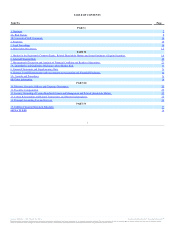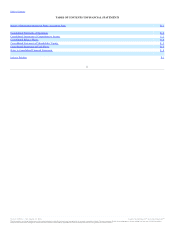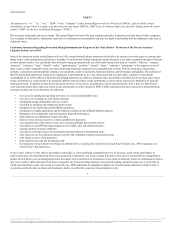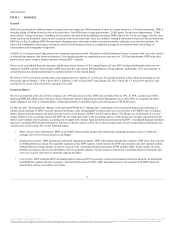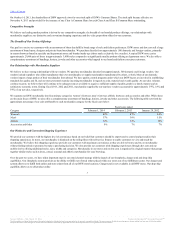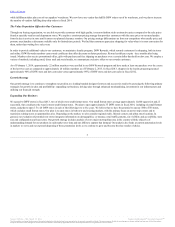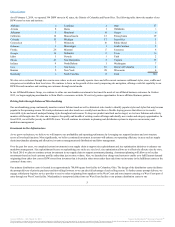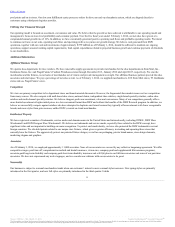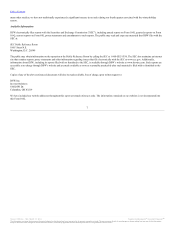DSW 2013 Annual Report Download - page 13
Download and view the complete annual report
Please find page 13 of the 2013 DSW annual report below. You can navigate through the pages in the report by either clicking on the pages listed below, or by using the keyword search tool below to find specific information within the annual report.
Table of Contents
We rely on our strong relationships with vendors to purchase brand name and designer merchandise at favorable prices. If these relationships
were to be impaired, we may not be able to obtain a sufficient assortment of merchandise at attractive prices, and we may not be able to respond
promptly to changing fashion trends, either of which could have a material adverse effect on our business and financial performance.
We generally do not have long-term supply agreements or exclusive arrangements with any vendors and, therefore, our success depends on maintaining strong
relationships with our vendors. Our growth strategy depends to a significant extent on the willingness and ability of our vendors to supply us with sufficient
inventory to stock our stores. If we fail to maintain our relationships with our existing vendors or to enhance the quality of merchandise they supply us, and if
we cannot maintain or acquire new vendors of in-season brand name and designer merchandise, our ability to obtain a sufficient amount and variety of
merchandise at favorable prices may be limited, which could have a negative impact on our business. In addition, our inability to stock our sales channels
with in-season merchandise at attractive prices could result in lower net sales and decreased customer interest in our sales channels, which could have a
material adverse effect on our business. Further, if our merchandise costs increase due to increased material or labor costs, or other reasons, our ability to
respond or the effect of our response could adversely affect our net sales or gross profit. During fiscal 2013, merchandise supplied to DSW by three key
vendors accounted for approximately 19% of our net sales. The loss of or a reduction in the amount of merchandise supplied by any one of these vendors
could have an adverse effect on our business.
We may be unable to anticipate and respond to fashion trends and consumer preferences in the markets in which we operate, which could have a
material adverse effect on our business.
Our merchandising strategy is based on identifying each region’s customer base and having the proper mix of products in each store to attract our target
customers in that region. This requires us to anticipate and respond to numerous and fluctuating variables in fashion trends and other conditions in the
markets in which our stores are situated. A variety of factors will affect our ability to maintain the proper mix of products in each store, including: variations
in local economic conditions, which could affect our customers’ discretionary spending and their price sensitivity; unanticipated fashion trends; our success
in developing and maintaining vendor relationships that provide us access to in-season merchandise at attractive prices; our success in distributing
merchandise to our stores in an efficient manner; and changes in weather patterns, which in turn affect consumer preferences. If we are unable to anticipate
and fulfill the merchandise needs of each region, we may experience decreases in our net sales and may be forced to increase markdowns in relation to slow-
moving merchandise, either of which could have a material adverse effect on our business.
The loss or disruption of our distribution and fulfillment centers could have a material adverse effect on our business and operations.
For our DSW stores and affiliated businesses, the majority of our inventory is shipped directly from suppliers to our primary distribution center in
Columbus, Ohio, where the inventory is then processed, sorted and shipped to one of our pool locations located throughout the country and then on to the
stores. Through a third party, we also operate a West Coast facility where shipments bypass our primary distribution center and go directly to one of our pool
locations from the West Coast facility. For dsw.com, our inventory is shipped directly from our fulfillment center, supported by a third party, to our
customers. For charge-send, our inventory may be shipped directly from our DSW stores.
Our operating results depend on the orderly operation of our receiving and distribution process, which in turn depends on third-party vendors’ adherence to
shipping schedules and our effective management of our distribution facilities. We may not anticipate all the changing demands that our expanding operations
will impose on our receiving and distribution system, and events beyond our control, such as disruptions in operations due to catastrophic events, labor
disagreements or shipping problems, that may result in delays in the delivery of merchandise to our stores and customers. While we maintain business
interruption and property insurance, in the event our distribution and fulfillment centers shut down for any reason or if we were to incur higher costs and
longer lead times in connection with a disruption at our distribution and fulfillment centers, our insurance may not be sufficient to cover the impact to the
business, and insurance proceeds may not be paid timely.
If Stein Mart or Gordmans were to terminate our supply agreements, close a significant number of stores or liquidate, it could have a material
adverse effect on our business and financial performance.
Our supply agreements are typically for multiple years with automatic renewal options as long as either party does not give notice of intent not to renew. For
Stein Mart and Gordmans, our contractual termination dates are December 2015 and January 2016, respectively. In addition, the agreements contain
provisions that may trigger an earlier termination. For fiscal 2013, the sales from our Affiliated Business Group represented approximately 6% of our total
company net sales. In the event of the loss of either of these supply agreements, it is unlikely that we would be able to proportionately reduce expenses to the
reduction of
9
Source: DSW Inc., 10-K, March 27, 2014 Powered by Morningstar® Document Research℠
The information contained herein may not be copied, adapted or distributed and is not warranted to be accurate, complete or timely. The user assumes all risks for any damages or losses arising from any use of this information,
except to the extent such damages or losses cannot be limited or excluded by applicable law. Past financial performance is no guarantee of future results.


